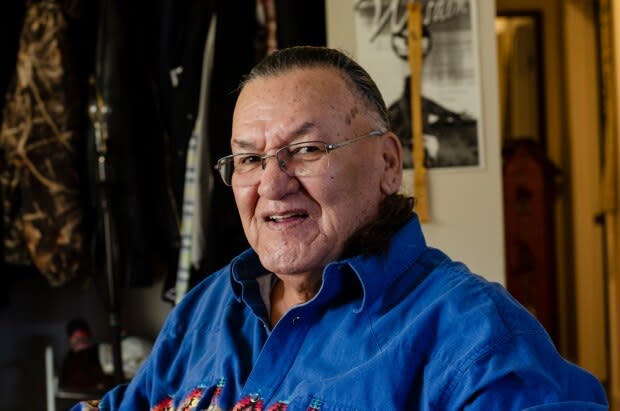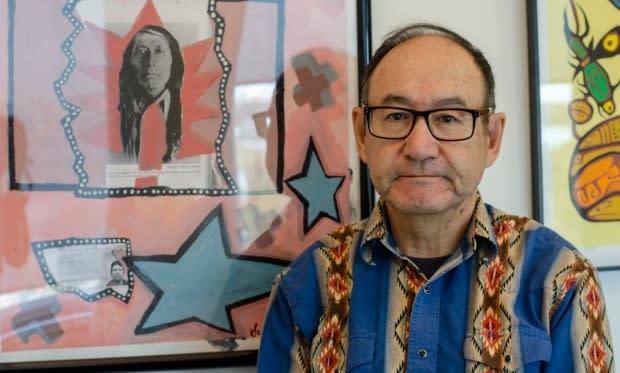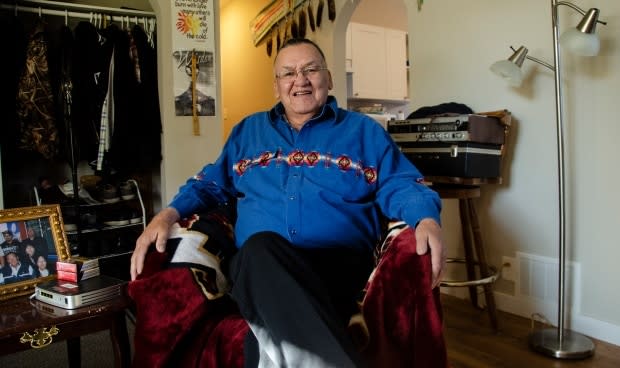Indigenous elders facing 'endless' demands as role expands
CBC Saskatchewan, CBC Manitoba and CBC North embarked on a months-long project to speak with elders, elders-in-training and youth from across their vast territories to learn how these knowledge keepers view their role today — and why they're more critical than ever before.
Read other stories from the Walking With Elders series.
Archie Weenie clicks down the volume on his ever-buzzing cellphone.
For a moment, the quiet room is filled only by birdsong floating through the kitchen window. Then another call comes in.
"See how it is?" He chuckles and mutes the phone.
Elder Weenie's marked-up calendar hangs in the sunlit room. He's approached for help daily — and he doesn't say no.
The Cree man from the Sweetgrass First Nation, west of the Battlefords in Saskatchewan, has practised cultural healing work for about 35 years, spending the last decade in the Regina area.
"It's busy. Sometimes you get tired but still you have to push yourself," he said. "That's the meaning of this work: once you're committed you've got to commit to it."
We make sacrifices. That's why [elders are] worthy to do the teachings. - Elder Archie Weenie
For years, he spent time at ceremonies and with elders, initially as a helper.
"You have to put a lot of time," he said. "That's how you become a leader."
At the time, he didn't realize that he would share their wisdom years later.
"Having that knowledge, wisdom from them, I give thanks."
Weenie now shares traditional ceremonies and practices like smudging and drumming. He gathers wood and rocks in the countryside so he can lead a sweat lodge ceremony once a week. People struggling with suicide, crime and addiction lean on him to find a positive path.

Often he stands at the front of a room and shares an opening prayer for meetings and events. Sometimes he shares about truth and reconciliation, or missing and murdered Indigenous women.
The emotional and physical work can be taxing.
"We make sacrifices," he said. "That's why [elders are] worthy to do the teachings."
'Burned off their feet'
The role of the elder has expanded beyond Indigenous communities and what some would consider more traditional roles.
"The elders that I know often have an endless demand placed on them," said Blair Stonechild, professor of Indigenous studies at the First Nations University of Canada. He is from Muscowpetung First Nation and is a residential school survivor.
Elders are now present within health, education and justice institutions. There are elder-in-residence programs at libraries. They often travel to speak or share at community events and meetings.
"Many elders are kind of burned off their feet, and at the same time, in the traditional system of elders, they really can't refuse when they're asked in the proper way."

Stonechild said it's critical, when calling upon their services, that people remember what elders carry with them, dating back to the harms of colonization and everything that followed: the Indian Act, residential schools, the Sixties Scoop and the current foster care system, broken families, addiction, loss of culture and tradition.
Stonechild said it's a shift toward a new type of modern elder, as fewer people grow up on the land and more elders are invited into institutions.
"They're being expected to provide ready solutions for intractable problems and be at the beck and call whenever," he said.
"I don't think it's ever been an easy job to be an elder to begin with, and I think to be an elder now is even more challenging."
Through work, Elder Weenie heals
Elder Weenie doesn't mind that more people are asking for help healing, but at times it can be tiresome.
"This work I have been doing for many years, I don't know if I'd do it again," he said, laughing. "Because it's so demanding, and you've got to be sincere. You've got to do things right."
By sharing with others, though, Elder Weenie said he heals, too.
There was a time when Elder Weenie lost his way. He squeezes his eyes shut, rocking his crossed arms back and forth, remembering how his mother cradled him and soothed him as a young boy. His mom was brought up "in the old way," as his grandparents kept her from residential school. But his dad attended residential school and died young "of alcohol poisoning with the Bible in his hand."
Elder Weenie followed suit as a young man, falling into addiction.
"That just about did me in," he said. But he found his way back to tradition.
"I'm always praying — that's not the real term but that's the closest we can get."

When Elder Weenie wakes in the morning, he thinks of kindness and chants the songs within his heart. He gives thanks, then smudges.
"This is my way of life, my journey."
In March, he went to the hospital for what was supposed to be a routine day surgery. Something went wrong and Elder Weenie said he was wheeled back into the operating room.
"That second time, I died. I died and I fought back. I fought back to come back," he said. Elder Weenie said he called out to his ancestors and greater power, and the call was answered.
"I came back to continue my teachings."
'A huge sense of urgency'
As the current generation of elders ages, there is a sense of urgency to share — and keep — knowledge.
Saskatchewan communities have mourned the loss of prominent and respected Indigenous elders in recent years, like Noel Starblanket, Tony Cote, Tyrone Tootoosis and Mike Pinay.
"You've got the last of the fluent speakers — the ones that were raised in the language, the ones that were raised on the land," said Winona Wheeler, a member of the Fisher River Cree Nation in Treaty 5 territory. She's a professional historian and a professor of Indigenous studies at the University of Saskatchewan.
"There's a small generation coming up behind them, but it's nowhere near what it was three generations ago."

Wheeler said fewer people are brought up walking with elders and learning ceremony on the land. That way of life is not feasible for many.
"I figure that, unless people are proactively teaching their children the language at home, within a couple of generations the elders are going to be English speakers," Wheeler said.
She noted philosophy, spiritual beliefs, cultural reasoning and world views are rooted within language.
"There's concepts in Cree that don't exist in English," she said. "They have to work really, really hard to translate not just words but philosophical beliefs."
Wheeler notes that even the word "elder" is an English word and isn't an exact translation. Despite what some may think, it's not a blanket term.
She also cautioned most elders have specialized knowledge; they aren't jacks of all trades. Others feel disrespected.
"They get invited to come to these meetings and do opening prayers and closing prayers, but they're not utilized," she said. "Some of them feel tokenization."
Access to knowledge is not a right
This is why it's important for community members to build up meaningful relationships and trust with elders, said Kallie Wood, the University of Regina's executive lead of Indigenization, "so they're actually coming in because they're wanted, not just for a checkbox."
The idea of bringing elders into institutions is contrary to tradition.
"The access to knowledge wasn't a right. It was a privilege and it was something that you made personal sacrifices for, you gave something in exchange," she said.
The context is changing, and Wheeler worries that the importance of that knowledge is getting lost.
"When an elder or a teacher, a traditional knowledge keeper, is brought in to share that, you're getting something pretty special."
Moving forward, Wheeler said it is elder helpers who are critical in helping elders deal with the demands and physical realties. They're also key to safeguarding tradition.
There was once a time where helpers could live beside elders, practising teachings through living. That opportunity is limited today.
"Spiritual people are saddened by that and a lot of young people are frustrated by that — they can't just give up everything and move."
Elder Weenie said he tries not to dwell on the potential loss of knowledge or the risk of burnout as he gets older.
"It worries me but what can I do? I have to keep trying."


